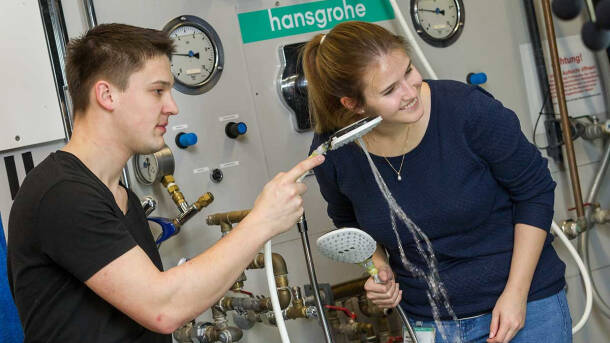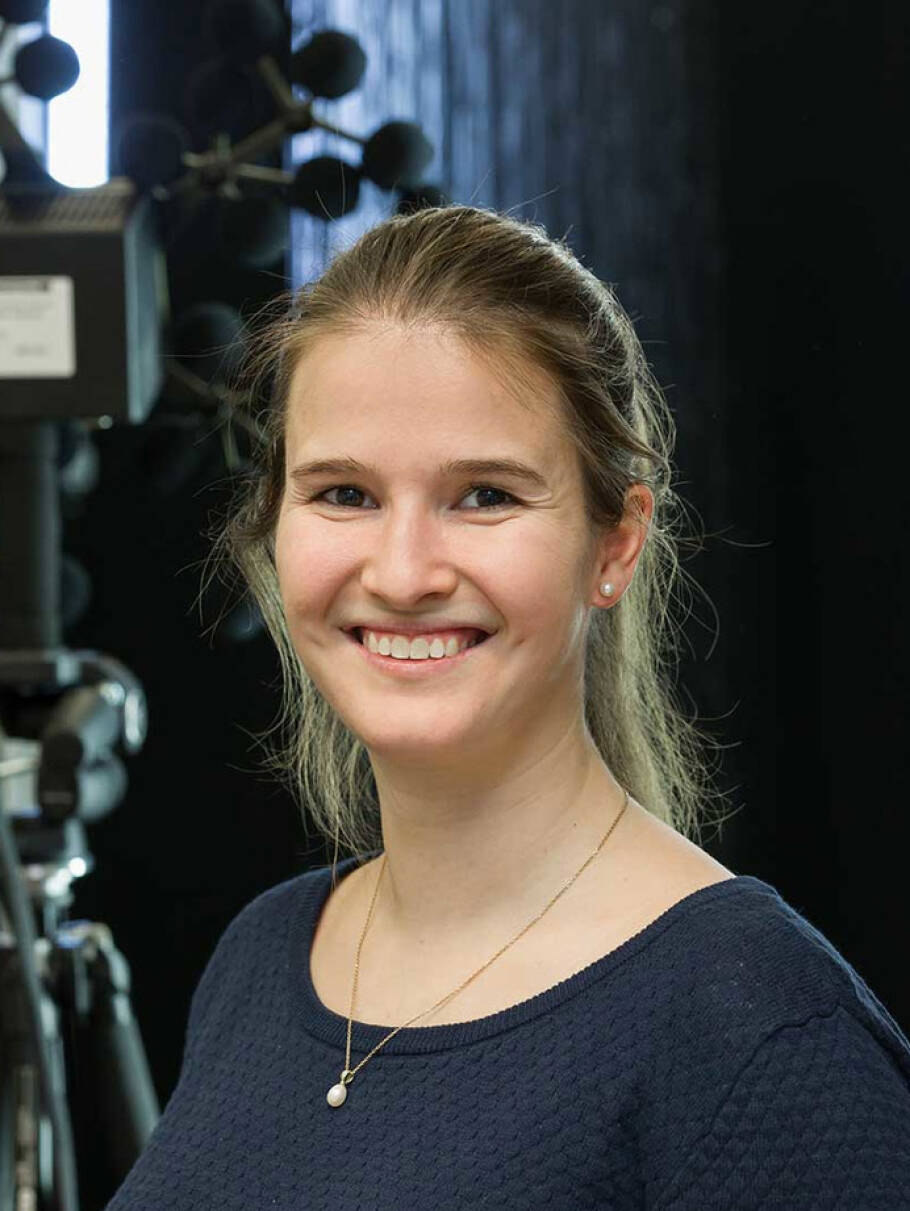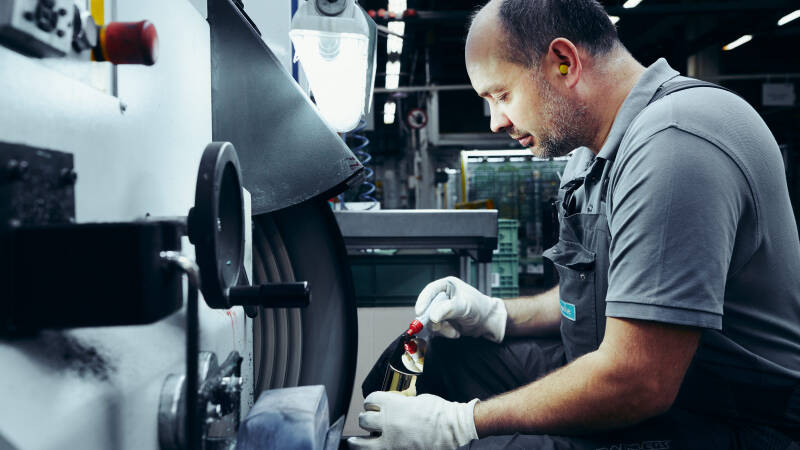Sound Quality in the Bathroom: The Perfect Water Sound
The appearance, function, and material of a shower or faucet are "premium" at Hansgrohe – as is the quality of the sound. In the in-house spray laboratory, acoustics expert Melanie Grüner researches the perfect water sound for Hansgrohe branded products. This allows customers all over the world to feel completely at ease in the bathroom and enjoy a pleasant sound quality.

Sound design: Listening carefully in the airborne sound test cabin

A Hansgrohe employee stands in a lined box and listens carefully. For the umpteenth time, she tries to discern background noise from inside the hand shower. But there is none. Her acoustic camera doesn’t show anything, either. If there’s no red dot flashing on the screen, it means no hidden sound source, no more acoustic problem. "This shower is our quietest hand shower," Melanie Grüner says, smiling in her airborne sound test cabin. "It’s about ten times quieter than its predecessor model."
Even at Hansgrohe, that is a quantum leap in terms of sound quality. For customers, this means: The quieter their shower, the greater their sense of well-being. With these kinds of showers, they can even shower at night without disturbing anyone.
Sound expert Grüner is pleased that, today, months of research and development are coming to an end. Because the fact that the Raindance hand shower with the spray mode PowderRain is whisper-quiet actually has something to do with science. Grüner, the good ear of Hansgrohe as it were, works in spray research. There, in the factory in the Black Forest, a team of specialists with the highest scientific standards is working meticulously on optimal product quality.
Shower and faucet construction is a science in its own right
Spray researchers investigate water jets and their behavior, using 3D technology (rapid prototyping) as well as CAD (computer-aided design). "Completely in the interests of our customers, we’re using our expertise to optimize the geometries of components in such a way that the joy of a good shower is not impaired by annoying noises," says Melanie Grüner.
That's why the engineers, development mechanics, and design engineers with whom she works closely together spend what seems like an eternity on the noise analysis of a faucet or shower. As long as not everything is polished to perfection, they play quality ping-pong in thousands of cycles until the product can go into series production. For every faucet, every shower of the premium brands AXOR and hansgrohe, the same is true: They are reproducibly analyzed, compared, and classified. Each new prototype builds on the findings and test results of its predecessor models. This is basic research.
Why premium showers sound better than cheap showers
"Here," says the acoustics expert on the Hansgrohe Lab test bench, turning up the water and holding up a no-name, hardware store shower. "That's the sound of showers whose inner life is of little concern to you." It rustles, whirs, and sounds hollow. "It is hollow, too."
Cheap showers often consist of only a few parts, are lightweight, and made of simply processed plastic. "This creates large resonating bodies; the whole thing vibrates and rattles," Grüner knows. Even worse: The water crackles uncontrollably on the skin and splashes around in the bath. It's different with premium: top design, excellent materials, perfect construction. The shower is stable in the hand, and the water jet is purposeful and direct – for pleasant, quiet showering pleasure.

Sound designer: A job at Hansgrohe
Process engineers have good career opportunities
The perfect tapestry of sound, and what it says about product quality
When manufacturing branded products, form, function, and durable material are not the only the quality features; there’s also pleasant sound. "I help make sure the water experience with showers and faucets can truly be enjoyed with all the senses, including acoustically," says Melanie Grüner. "For a perfect water sound, the water jets can’t be too loud or accompanied by unpleasant background noises," she explains. The pleasant tapestry of sound under the shower, in the bath tub, or at the vanity is by no means a matter of taste. There are Europe-wide standards for noise testing. Which means: The volume of the "structure-borne sound" is regulated by law.
Showers, bath tubs, and vanities without annoying background noise
One of the most important national approvals is the DIN-DVGW approval, issued by the certification body of the German Technical and Scientific Association for Gas and Water. This body classifies faucets and showers according to the acoustic groups I or II. The quietest showers are awarded the best seal of quality in acoustic group I. These are mainly bathroom noises that can be heard in adjoining rooms – transmitted by pipelines, walls, or ceramics.
“Noise behavior is one of the inner values of a faucet or shower, and is an expression of product quality.”Melanie Grüner, acoustics expert in the Hansgrohe Group
If the structure-borne sound is louder than the standard allows, people in the next room or the neighboring apartment will annoyed by noise. "Our goal is to certify all products in Group I," Melanie Grüner explains. The scientific test series and standardized inspections she and her colleagues are working on will help Hansgrohe products achieve the best acoustic group.
The Hansgrohe standard of quality: Higher than the norm
In numbers, that means: A faucet or shower may reach a maximum of 20 decibels at a pressure of three bar. Below that, it’s as quiet as a slight rustling of leaves in a deciduous forest. It’s ideally suited for apartment or hotel construction – as well as offices, doctors’ offices, hospitals, or schools.
The Hansgrohe Group is (voluntarily) going one step further: With their super-quiet products, the sanitation specialists ensure that "airborne noise," i.e. what the consumers themselves perceive when bathing, washing, or showering, is drastically reduced. This is called "acoustically undiluted joy of water" or, a quite pop-scientific way to put it: the feelgood factor.



